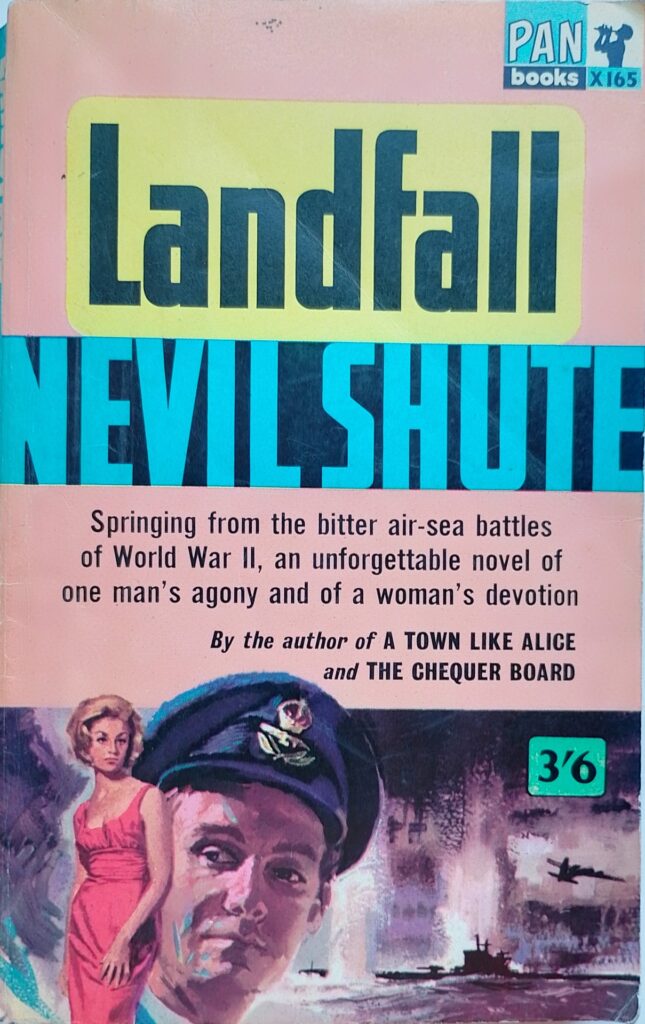First published 1940. Pan paperback, 1962, pp240, c.72,000 words.
This book was written in the early days of the second world war, and its story is contemporary. The course and outcome of that war was unknown and there is a surprising air of confidence in British power and technical prowess. Nevertheless there is a great deal of realism in the human nature of military command and that uncontrollable elements, such as the weather, can have a big impact.
The story concerns an RAF pilot in his early twenties who is flying reconnaissance missions over the English Chanel: trying to spot and destroy enemy shipping. This is mostly very dull work, flying back and forth in a careful pattern. The weather can make the task near impossible, and concentration is difficult over many hours in a cramped, cold and relatively primitive airplane. The task is further complicated because it requires liaising with the Navy, who would like to be doing the work themselves. Shute knew all about this from his career as an aviation engineer, and the details add a layer of authenticity to the story.
We first meet Jerry Chambers in his small car, trying it on with the local barmaid, Mona Stevens. There is a significant class difference between the two, but she is sharp-witted and a quick learner (and of course, beautiful). As always in war, the fog descends and it is not at all clear who is a hero and who is a villain. Chambers is stoic and phlegmatic: defence against the risks he has chosen to undertake and the consequences of action. Stevens is perfectly placed to pick up odd bits of gossip and piece things together. What actually happened becomes clear to the reader before any of the characters, but satisfyingly so.
There are the usual role differences of the period here: men do the fighting, women may work, but in support roles. Opportunities for women were, of course, greater during war-time, but the tasks they were employed in were limited, especially so at the start of the war. This is presumably a realistic description of gender roles and relations in 1940. A young couple getting to know each other, particularly for those with middle-class aspirations, were cautious at best. There are many oblique hints of how the physical relationship between the two progresses and their desires develop. This is well handled and again appears to be entirely realistic.
The story is told from many points of view, and mostly this is handled well. There are just a couple of stumbles; for example when the authorial voice appears for a paragraph [p115]. Sometimes the writing is a little clunky: ‘There were four machines in the patrol.’ [p19], and ‘The strain of war was telling on him, making him difficult.’ [p105] – something that was already obvious. At one point a change of scene seems sudden and could do with at least a paragraph break [p198]. ‘One or two old cannons graced the entrance…’ [p199] – make your mind up.
Mona’s voice is very well articulated, resonating with phrases of the period: ‘I’d like that ever so.’ [p121], ‘ever so glad’ [p122], ‘Don’t talk so soft.’ [p191]. The banter between Jerry and Mona has a lot of light humour in it, resonate of a young couple getting to know one another – particularly when their backgrounds differ.
Shute writes with simplicity and clarity which makes for easy reading. His story is very well constructed and engaging. While the war-time setting and period social structure may seem archaic, this is still an enjoyable read.
Wikipedia biography of Shute: https://en.wikipedia.org/wiki/Nevil_Shute
Wikipedia summary of the book: https://en.wikipedia.org/wiki/Landfall:_A_Channel_Story
Others’ reviews of the book: https://www.goodreads.com/book/show/123962759-landfall-by-nevil-shute?ref=nav_sb_ss_2_14
© William John Graham, October 2023

